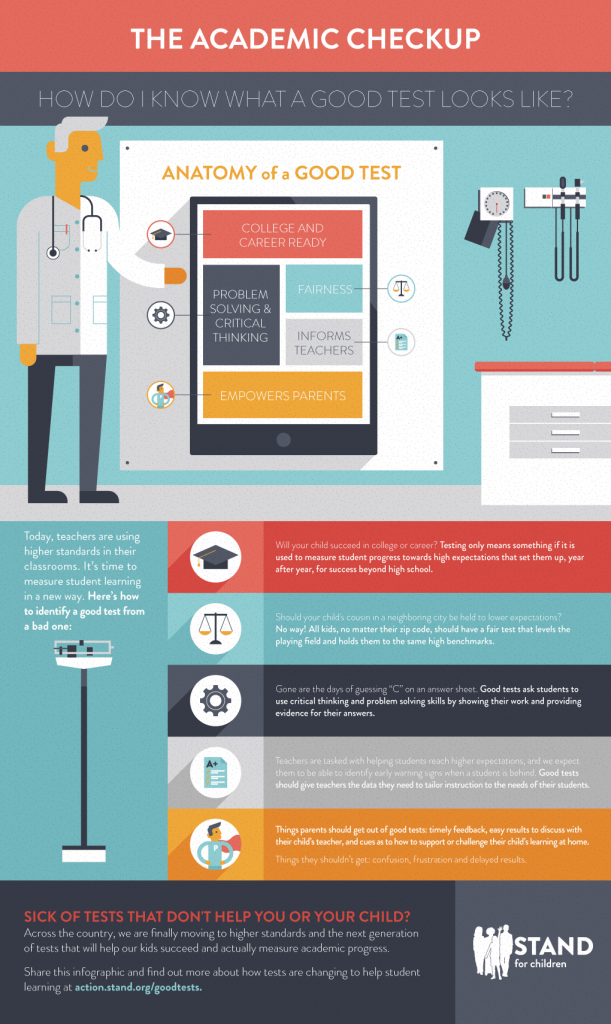I’ve written previously about how the harm anti-reformers are claiming tests bring to students is more of the grit and character they need. I’ve written about how parents seem to make decisions about testing with little or no regard for that what reality means for the student when they go to school on test day and how prepared they will be for future tests.
A U.S. News article really brings it home for us with a very specific story. It’s titled: Opting out isn’t an option in the real world.
The writer talks about how she avoided tests too, actually avoided school all together and dropped out. She talks about how life is one big test and that there are endless tests after you leave high school.
I didn’t want to be reduced to a number or a statistic, a score or a grade, a label or a stereotype. I filled in the bubbles on tests in poetic form, ABABC. And then I dropped out. And that’s when tests got real.
But she couldn’t run away from those tests.
Then I was studying alone for the GED, then the SAT, then the community college placement test on breaks at the coffee shop where I worked. Plowing through a year at a commuter school, where too many went and too few stayed, and fighting my way to university. And then working the next 15 years for a civil rights organization fighting to secure equal educational opportunities for all students.
It took all that for me to finally understand that you actually can’t opt out, walk out or otherwise check out of tests as a permanent strategy. Not if you want to get anywhere. Because, regardless of your feelings about them, tests will never stop. On the way to wherever you want to go lie a series of tests – whatever your direction, whatever your goal. There are the college admissions tests. The Armed Services qualifying tests. The get-a-job tests. The get-a-better job tests. The licensure tests. The promotional tests. Moments where you have to prove yourself – your skills, your knowledge, your merit, your determination.
She brings out a true reality that the real world hits you with. In high school and college if you go, there are known structures and expectations. Once you are out, you’re on your own. And you are going to hope you have the skills to make it on your own.
While they now call the tests you take in school “high stakes,” they are the lowest you will ever encounter. And the only ones where, if you don’t do so well, somebody actually has an obligation to help you do better. Because after you leave the comfortable – or even not-so-comfortable – nest of high school, it is all on you. You alone will be held accountable for what you know and what you don’t. What you were taught and what you weren’t.
Because you can’t walk out of the ACT or the SAT. Not the GRE, LSAT or the bar exam. Not the cosmetology exam, the Test of Adult Basic Education or any professional exam.
She makes the point the sometimes the best thing to do is make change from within. While the tests aren’t perfect, they are better. And that some teachers may be more preoccupied with their jobs than student success on tests. I’m glad she said it, because it would be hard for me say it!
What I learned in my own journey through education, and later as an advocate, is that sometimes the most radical thing you can do to change the system is not to secede, but to succeed. That sometimes fighting the system means working from inside it, pressing for the things you and your peers need. To raise hands, raise issues and raise stakes by participating, instead of by withdrawing. To call for attention – and for change – so that all students get the skills and knowledge they need to thrive. Not just some.
And one of the best chances we have to do that right now – as tedious or regimented as they may feel right now – is through these new tests, which finally measure what matters instead of just how many bubbles you can fill in.
Don’t play into anyone’s hand. Or fall for the things you’re told about those tests by adults who may actually be more preoccupied with their job security than your education.
Don’t opt out of testing & life – opt in.





 d for Children about how to tell what a good test looks like. I agree with everything they state below, especially that every student needs to be held to the same standard nationwide so we can ensure they are receiving a great education.
d for Children about how to tell what a good test looks like. I agree with everything they state below, especially that every student needs to be held to the same standard nationwide so we can ensure they are receiving a great education.